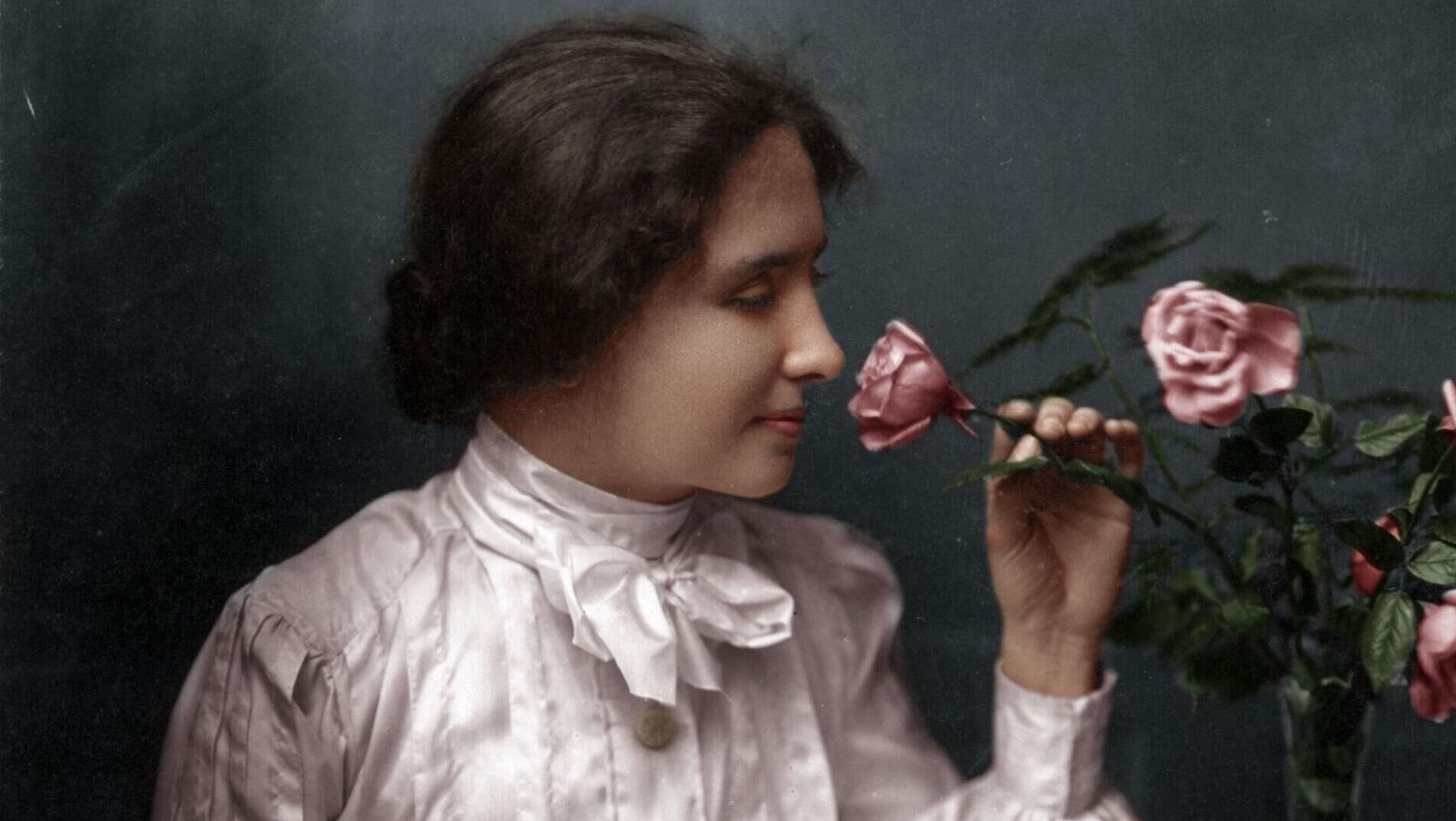Class 7 English Unit 1 Short and Long Answer Questions - Three Days to See
Short Answer Questions
Q1: How does Helen Keller enjoy nature without sight?
Ans: Helen Keller enjoys nature by touching things. She feels the shape of a leaf, the smooth bark of a tree, or the rough surface of a pine. In spring, she touches tree branches to find buds, sensing nature waking up. She also feels a bird quivering with song on a branch, which brings her joy. These tactile experiences allow her to connect with the natural world despite being blind.

Q2: What does Helen want to see on the first day of sight?
Ans: On the first day, Helen wants to see the people who have made her life special through kindness and friendship. She wishes to look into their eyes, which she calls the "window of the soul," to understand their true feelings. Since she knows her friends by touching their faces, seeing them would deepen her appreciation of their importance in her life.
Q3: Why does Helen plan to visit museums on the second day?
Ans: Helen plans to visit museums on the second day to learn about the world’s past and present. She wants to see models of ancient animals like dinosaurs and understand how humans have grown smarter over time. Museums offer a condensed view of history, allowing her to explore the beauty and knowledge of life’s evolution through sight.
Q4: What does Helen observe in the city on the third day?
Ans: On the third day, Helen observes people in a busy city, standing at a street corner to watch their faces. She looks for smiles, serious expressions, or signs of sadness. She feels happy seeing smiles, proud of hardworking people, and kind toward those struggling, aiming to understand and connect with the daily lives of ordinary people.
Q5: What advice does Helen give to people who can see?
Ans: Helen advises people who can see to use their eyes as if they might lose their sight tomorrow. She encourages them to look at the world with wonder, noticing its beauty. She also suggests fully using other senses—listening to music, touching things, smelling flowers, and tasting food—to find happiness and appreciate life’s joys.

Long Answer Questions
Q1: How does Helen Keller describe her connection to nature through touch, and why does she long for sight?
Ans: Helen Keller describes her deep connection to nature through the sense of touch, finding joy and intimacy in it, even though she is blind. She feels the symmetry of leaves, the smoothness of tree bark, and the roughness of pine, allowing her to experience the world’s beauty. In the spring, she touches branches to discover budding leaves, sensing nature’s revival after winter. The movement of a bird singing on a branch fills her with happiness, connecting her to the liveliness of the world. While these tactile experiences are precious, she longs for sight, believing it would reveal even more, like colors and light, that touch cannot convey. She imagines how sight would allow her to fully witness the grandeur of nature, such as the beauty of a sunrise. This longing highlights her desire to experience the world more completely while appreciating the sensory experiences she already has. Her message encourages valuing all senses, as sight would only deepen her already rich connection to nature.
Q2: Why does Helen Keller focus on people during her imagined first and third days of sight?
Ans: Helen Keller emphasises people during her first and third days of sight because human connections play a central role in her understanding of the world. On her first day, she is eager to see her loved ones, whose presence has been a source of happiness and support. Having known them through touch, she now wants to look into their eyes—the “window of the soul”—to understand their emotions more deeply, strengthening her bond with them. On the third day, she turns her attention to strangers in a busy city, studying their faces to sense their emotions—whether joy, seriousness, or sadness. This observation allows her to connect with the lives of everyday people, sharing in their experiences. By focusing on both loved ones and strangers, Keller seeks to understand the emotional depth that sight can reveal, something touch alone cannot convey. Her emphasis on people reflects her belief that human experiences are profound and that sight can enhance her empathy and connections with others. This focus reinforces her message of appreciating life’s full spectrum, including the relationships that make it meaningful.

Q3: How does Helen Keller’s plan for the second day reflect her curiosity about the world?
Ans: Helen Keller’s plan for her second day shows her deep curiosity about the world by focusing on nature and human history. She begins by watching a sunrise, excited to see how night turns into day with bright light, revealing the earth’s beauty. This shows her desire to experience the visual wonders of nature that touch can’t capture. She also plans to visit museums to learn about the past, seeing models of ancient animals like mastodons and dinosaurs, and exploring how humans have progressed over time. Museums give her a way to understand life’s history and growth in a small, exciting form. Her choices show a strong desire to learn about both nature and human achievements, things she could only understand through touch before. By focusing on these experiences, she shows how much she wants to discover and appreciate the world. This plan encourages readers to be curious and value all the senses.
Q4: What does Helen Keller’s third day reveal about her empathy for others?
Ans: Helen Keller’s third day shows her deep empathy for others through her desire to connect with people in a busy city. Standing on a street corner, she watches their faces, noticing smiles, serious looks, or sadness. She feels happiness when they are happy, pride when they work hard, and kindness toward those who are struggling, showing her ability to share in their emotions. By observing strangers, she wants to understand the lives of people she doesn’t know, extending her compassion beyond her close circle. Her blindness has made her value human experiences through touch, but she believes sight would allow her to understand their emotions even better, creating a stronger connection. Her empathy is also shown in her advice to others, encouraging them to appreciate their senses and be kind to those without sight or hearing. By focusing on people’s expressions, she demonstrates a desire to relate to humanity’s joys and challenges, reinforcing her message to live with gratitude and compassion for everyone.
Q5: What lessons does Helen Keller’s essay teach about appreciating life and senses?
Ans: Helen Keller’s essay teaches valuable lessons about appreciating life and our senses, encouraging readers to value what they often take for granted. Through her imagined three days of sight, she shows that even small things—a leaf’s shape, a friend’s eyes, or a stranger’s smile—are full of wonder. Her joy in experiencing nature through touch, like feeling a bird’s quiver, emphasizes how our senses enrich life, but she also sees sight as the most amazing sense and urges readers to use it fully. By planning to see her loved ones, nature, history, and everyday life, she shows that every moment holds beauty worth cherishing. Her advice to live as if we might lose our senses tomorrow encourages gratitude and mindfulness, inspiring people to truly appreciate music, objects, flowers, and food. She also encourages empathy, advising kindness toward those who lack certain senses, like herself. Her thought that three days wouldn’t be enough highlights life’s vast beauty and motivates readers to embrace each day with wonder. The essay inspires a deeper appreciation for our senses and for life itself, encouraging a grateful and engaged approach to the world.
|
55 videos|465 docs|76 tests
|
FAQs on Class 7 English Unit 1 Short and Long Answer Questions - Three Days to See
| 1. What is the main theme of "Three Days to See"? |  |
| 2. How does Helen Keller describe her experience of seeing in the essay? |  |
| 3. What lessons can readers learn from "Three Days to See"? |  |
| 4. How does Keller's perspective on disability contribute to the message of the essay? |  |
| 5. Why is "Three Days to See" considered an inspiring piece of literature? |  |
















